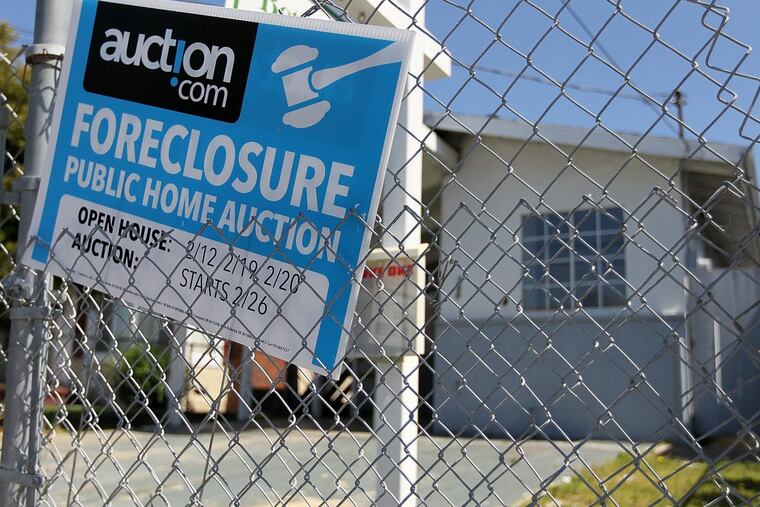N.J. stops taking applications for programs offering foreclosure relief
The HomeKeeper and HomeSaver programs are working through a backlog of existing filings.

Two New Jersey programs that provide financial assistance to homeowners on the brink of foreclosure are temporarily suspending acceptance of applications, a state official said this week, bringing an indefinite hiatus to a set of funds that have helped thousands of residents stay afloat in the aftermath of the Great Recession.
New Jersey's HomeKeeper and HomeSaver programs, both of which are housed under the state's federally bankrolled Hardest Hit Fund, are not taking new applications "in order to better assist the current pipeline of applicants," Tammori Petty, director of communications for the state's Department of Community Affairs, said in emails this week.
"The agency wants to ensure that there is enough funding to process all applications that are currently in process," Petty said. "… No new applications are being accepted at this time."
The decision to suspend new applications to the assistance programs comes as homeowners across New Jersey remain in the throes of the state's foreclosure crisis. Nearly 2 percent of housing units in the state — almost 68,000 properties in total — are in some state of foreclosure, according to Attom Data Solutions, a California company that tracks foreclosures. In November alone, one out of every 737 housing units in New Jersey had foreclosure proceedings initiated against the homeowner, a rate far higher than the national average of one out of every 2,074 units.
Since September 2015, New Jersey has had either the highest or second-highest number of new foreclosure proceedings filed every month, said Daren Blomquist, senior vice president for Attom.
"That's the bad news," Blomquist said. "The good news is that we have seen the numbers turn a corner and start to go down. In November, the number of new foreclosure filings was down 19 percent from a year ago."
Like elsewhere nationwide, New Jersey's foreclosure crisis was born out of the collapse of the housing bubble in the mid-2000s. Yet a host of other problems have contributed in the Garden State, too: In 2010, the state Supreme Court issued a moratorium on foreclosure activity as accusations surfaced that foreclosure affidavits were being signed without verification of their accuracy. Meanwhile, New Jersey's judicial foreclosure process — meaning that lenders must go to court to repossess a property — has elongated the foreclosure process. (Currently, it takes an average of 1,281 days in New Jersey, according to Attom.) Plus, the devastation of Hurricane Sandy in 2012 and the economic downturn in such places as Atlantic City exacerbated the problem, Blomquist said, creating a "perfect storm of issues."
To help states such as New Jersey, the U.S. Treasury Department established in 2010 the Hardest Hit Fund, to provide financial assistance — $9.6 billion total — to homeowners facing foreclosure in 18 states and Washington.
To date, according to the Treasury Department, New Jersey has been allocated more than $415 million, which the state's Housing and Mortgage Finance Agency has disbursed into three programs: nearly $315 million for the New Jersey HomeKeeper program; $30 million for the HomeSaver program; and $26 million for the HomeSeeker Down Payment Assistance Program, as well as $45 million in permitted expenses.
The current HomeKeeper program offers homeowners up to $48,000 to cover arrearages or monthly mortgage payments for up to 12 months if that homeowner experienced a hardship, such as a death in the family or job loss. The HomeSaver program, similarly, offers homeowners facing a hardship up to $50,000 to help make their mortgage payments more affordable through a refinance, recast, or modification of their home loan. And the HomeSeeker program provides $16,000 for first-time homebuyers and veterans in select counties to help with a down payment or closing costs.
The first two programs suspended acceptance of new applications Dec. 15, the latter was suspended on Aug. 31, according to the program's website.
So far, according to Petty, two iterations of the HomeKeeper program — one that expired in 2013 when all funds were emptied, and a new version launched in 2016 — have helped nearly 7,200 families, providing nearly $282 million in aid. The HomeSaver program, meanwhile, has helped 843 families with $13.3 million.
Petty said she expected there will be at least 1,000 applications pending.
With nearly $300 million provided in foreclosure assistance, New Jersey's Hardest Hit Fund does appear to be nearing the end of its allocated money. Even so, the management of New Jersey's fund, as well as funds across the nation, has been scrutinized for years by the Special Inspector General for the Troubled Asset Relief Program, a Treasury Department watchdog.
In its third quarter of 2017 report, the watchdog identified New Jersey's Hardest Hit Fund as having "significant inefficiencies." According to data through March 31, the inspector general found that 53 percent of homeowners who sought help in New Jersey were denied — one of the highest denial rates nationwide. And an October 2015 report from the watchdog found that New Jersey homeowners applying for the HomeKeeper program had a median wait time of 188 days — more than six months — throughout the life of the program, until the second quarter of 2015. In addition, the same report showed, New Jersey homeowners had, at times, waited nearly three years for assistance from the fund. No updated wait times were provided by the inspector general.
In an email Thursday night, Petty said it now "takes the New Jersey Housing and Finance Agency between 45 to 60 days to review a fully completed application."
Petty said the reopening of the programs' applications process will be determined at a later date.